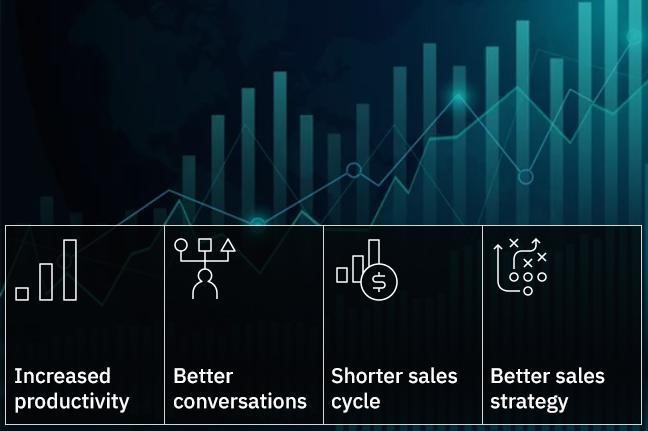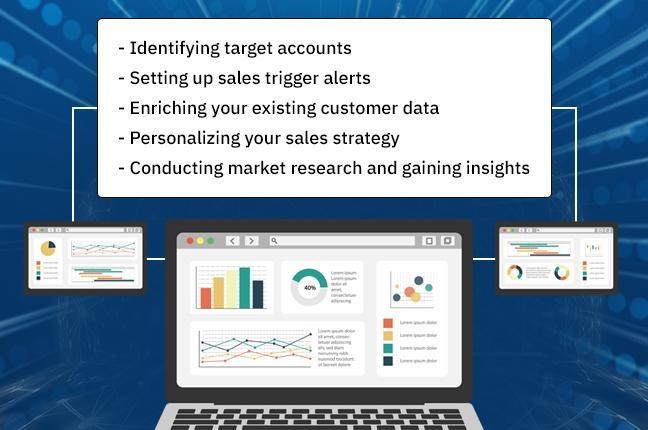Introduction
Digital technologies haven’t just made businesses smarter and more competitive, they’ve also made customers and buyers more informed. Especially when it comes to B2B sales, buyers these days conduct thorough research regarding the market, as well as the numerous products/services available to them. What this essentially means is that companies need to be more intelligent in their sales processes if they wish to turn prospects into clients. How can they do that? By keeping track of every bit of information about their company, their market, their competitors, and their prospects. This helps them gain an advantage over said competitors, while also increasing their chances of closing the deal. This is exactly what account intelligence is meant for. In this article, we’ll discuss what account intelligence is, and how it can help you close more deals. Let’s begin.
What is account intelligence?

Account intelligence can be defined as the process of gathering information on prospective clients/customers through multiple sources and channels. You can think of it as an offshoot of market and competitive intelligence that focuses on an organization’s prospects. Account intelligence gathers insights that help the sales teams understand the context and behavior of a prospect/buyer. According to Forbes, buyers report having higher expectations from sellers. They expect sales reps to understand buyer preferences and focus on helping buyers achieve their goals rather than making a quick sale. Thus, a deeper insight into a buyer’s corporate history, financial performance, and preferences is necessary for sales teams to determine their intent. Account intelligence helps to bridge the gap between your sales team and your prospects, as well as sales and marketing, enhancing the sales conversation and helping to move negotiations with potential clients forward. When executed effectively, account intelligence can be the greatest tool ever to grace your sales team’s arsenal.
Why is account intelligence important?

Account intelligence is important because it helps sales professionals find, monitor, and understand information that provides them insights into their prospects and existing customers. These insights help salespeople stay up to date about any moves made by their target accounts or any changes that might affect the nature of business with them. As more and more organizations begin to use account intelligence to understand their target accounts and the pain points of the decision-makers at those organizations, it is soon becoming a must-have for sales success. However, organizations aren’t adopting account intelligence simply as a trend, but due to its proven effectiveness and the benefits it offers.
What are the benefits of account intelligence?

Account intelligence exists for the sole purpose of keeping salespeople informed, and helping them perform their job better. Here are some of the several benefits it offers to salespeople.
1. Increased productivity
When you continuously monitor your prospects through account intelligence, it becomes easier to understand their intent and identify those prospects who are actively engaged in a buying decision based on the content on their website, news, and other sources. This approach saves time and effort, which would have been wasted chasing low-interest leads.
2. Better Conversations
Most of the time, conversations with prospects are less about the product or service and more about their goals, pain points, hesitations, preferences, etc. But unless your salespeople know about these, conversations are going to turn out drab. Account intelligence helps you identify prospects’ interests and craft the right talking points, steering the conversation in a direction where you get positive responses.
3. Shorter Sales Cycle
Salespeople often chase the wrong prospects due to a lack of account intelligence, which makes the sales cycle unnecessarily long. Targeting one decision-maker in your target account is much better than targeting 10 employees who ‘might’ be able to influence the decision-maker. This requires actionable insights to understand the intent and to create personalized content for the decision-maker by leveraging said insights. This reduces average lead to close time.
4. Better Sales Strategy
Informed planning leads to better sales strategies. Account intelligence can help the sales leadership understand their prospects and their buying behavior better, allowing them to build sales strategies that better engage prospects and improve lead conversion.
How to find the right account intelligence?

Account intelligence is NOT sales data, i.e. a list of names, phone numbers, and email addresses. It is much more. As mentioned before, you need to understand who your ideal buyers are before you approach them. There are two things that must be determined before you target a buyer, and specific information is required to do that. Account intelligence is that information. Let’s have a look at what those two things are:
- Intent: Intent simply means if your prospect is interested in a product or service such as yours. To determine intent, you’ll need data on their marketing activity and social media activity, as well as any other sales triggers in the news that link the prospect to the need for a solution.
- Opportunity: Secondly, you monitor your accounts for opportunities such as leadership changes, new sources of funding, and/or acquisitions, which can act as signals to pursue them aggressively.
Now let us understand the different ways you can look for sales triggers or buying signals, and then gather target accounts based on their suitability, intent, and opportunity.
- By going through publications on the internet, such as case studies, e-books, solution pages, etc. that might point to organizations that could benefit from your product/service
- By following and monitoring companies on social media (this includes prospects and their competitors)
- By monitoring your competitors and their key accounts, identifying prospects that might be dissatisfied with your competitors’ offerings, and getting them on board
- By monitoring the news related to your prospects or news in which they are mentioned
- By attending webinars and conferences related to your prospect’s industry
- By identifying key events that could result in increased interest in your product or service
- By reading industry journals and analyst reports for guidance on market movement
Doing all of this manually requires a good amount of time, effort, and resources to be spent on gathering account intelligence. Most organizations these days simply use a market and competitive intelligence platform or software to automate all of this and thus save time and effort.
How can a competitive intelligence software help your organization with account intelligence?

As mentioned before, account intelligence is an offshoot of market and competitive intelligence that focuses on an organization’s prospects. Thus it is natural for organizations to use a market and competitive intelligence software to gather account intelligence. Here’s how an M&CI software can help with that:
1. Identifying target accounts
You can use insights provided by competitive intelligence software to identify individuals and accounts that match your ideal customer profile (ICP).
2. Setting up sales trigger alerts
Competitive intelligence software provides real-time data on your prospects by monitoring them and notifying you about any key events they are involved in using automated alerts.
3. Enriching your existing customer data
You can use insights from competitive intelligence software to enrich your existing sales data (again, a competitive intelligence software doesn’t provide sales data, it provides external information that enriches sales data).
4. Personalizing your sales strategy
The more information you have on a prospect, the better and more personalized experiences you can provide them in the way you sell to them. Personalizing your sales approach using insights from a competitive intelligence software yields higher-quality leads and more conversions.
5. Conducting market research and gaining insights
When you know how many potential leads are out there, you can forecast and allocate resources more accurately. Platforms like Contify, which offer market and competitive intelligence, as well as account intelligence, can help your organization target more high-quality accounts in addition to helping you keep a watch over your competitors.
How Contify can help with account intelligence?
At this point in the article, two things are perfectly clear:
1) that triggering engaging conversations with your key accounts is essential to upsell/cross-sell, and finally drive revenue, and
2) that a market and competitive intelligence platform is a much better way to collect account intelligence than doing it manually. Contify is not only a state-of-the-art market and competitive intelligence platform but a powerful account intelligence tool. Here’s how it can help you target key accounts to attain sales success through cross-selling/upselling and boosting revenue.
1. Empowers your sales/account executives
Building trust with your prospects/clients is an important part of account management. Contify provides insights on industry trends, prospects’ current business needs and new initiatives, and their competitors’ announcements, which could be related to prospects. These insights are sourced from over 5,00,000+ relevant business sources that allow you to drive conversations, and hence, conversions.
2. Helps create powerful messaging and content
Contify helps target key decision-makers in your target organization by helping create personalized messaging and content designed to resonate with them and build relationships. Account intelligence gathered using the Contify platform will let you embed thought-provoking insights and data into your content.
3. Facilitates sales operations
Contify not only allows you to get intelligence for your list of target accounts via smart filters, but it also allows you to track sales triggers such as evidence of interest, current vendor dissatisfaction, financial changes, changes in competitive tactics, growth, etc.
Conclusion
Account intelligence not only provides you with ammunition to use in closing deals with your ideal accounts, but it is also essential in this day and age where prospects are well-informed about the state of the market and expect personalized and relevant interactions with the sales function of the organization pursuing them. Thus, it is important for organizations to determine how they’ll gather account intelligence and how they’ll apply its insights to grow their client base and increase conversions. Competitive intelligence tools are the most preferred option to gather intelligence on key accounts nowadays, as they save a lot of time and manual effort, and can integrate with CRMs and sales enablement platforms to make things easier for salespeople and drive meaningful actions. Automating the collection of account intelligence using such platforms will provide actionable insights that get you better leads and clients.









